IntroductionThe five prayers are among the best acts of worship that the Muslim performs. Performing them is the best deed after having the correct belief in God and His Messenger. Prophet Muhammad, may Allah raise his rank, was asked what the best deed was and he said it was performing the obligatory prayers at the beginning of their times (al-Bayhaqiyy): When we say “prayers” we are referring to an act of worshipping God which has a specific format as God revealed to Prophet Muhammad, may Allah raise his rank. The prophets from Prophet Adam to Prophet Muhammad, may Allah raise their rank, ordered their followers to pray as per God’s orders. Since the prayer is the most important matter of Islam after having the correct belief in God and His Messenger, one must plan his life around the prayer. It would be a great sin to neglect praying when at work if a prayer was required at that time. If a believer is shopping at the mall or waiting at the airport and there is no way to get home or to a mosque, he is still obligated to perform the prayer within its due time instead of purposely leaving out or delaying the prayer. This indicates the importance of the obligatory prayer. Doing the obligatory prayer on time takes priority over other non-obligatory matters.
Chapter 1: Preparations Before Praying There are five prayers which are obligatory and rewardable. There are other prayers which are rewardable but optional to perform. The optional prayers require the same preparation as the five required prayers. There are several requirements of the person who performs the prayer. The person praying must be Muslim and must have reached the state of mental discrimination which is usually around seven lunar years (about 6 3/4 solar years). Taharah (Purification)The Muslim must have the proper Taharah (purification) before performing the prayers. This comprises the removal of najas (filthy) substances and performing wudu’ (ablution) or ghusl (full shower). Removal of Najas (Filthy substances)Islamically, there are substances that are considered filthy and must not be on the person’s body, clothes, place of prayer, or even carried when praying. Some of these substances include urine, feces, blood, vomit, pus, and discharges from the penis and vagina, except maniyy (semen and the woman’s fluid of orgasm) which is not filthy. To clean oneself after urinating and defecating, the person dries himself of all urine with toilet paper after urinating, and then pours water on the areas where the urine was. In the case of defecation, the person is correct if he removes the defecation with toilet paper and then pours water on the stained area to remove the traces. It is also acceptable to use either toilet paper or water only. However, the exclusive use of toilet paper has conditions. The urine must not go beyond the exit area and must not dry there. Also, one’s defecation must not spread past the area of the buttocks which comes together when one is standing. Wudu’ (Ablution)Allah revealed: قال الله تعالى: يَا أَيُّهَا الَّذِينَ ءامَنُواْ إِذَا قُمْتُمْ إِلَى الصَّلاةِ فاغْسِلُواْ وُجُوهَكُمْ وَأَيْدِيَكُمْ إِلَى الْمَرَافِقِ وَامْسَحُواْ بِرُؤُوسِكُمْ وَأَرْجُلَكُمْ إِلَى الْكَعْبَينِ This verse from the Qur’an means: “0 you who believe, if you stand up for prayer, wash your face and arms up to [and including] the elbows and wet wipe [part of] your head and wash your feet up to [and including] the ankles.” (al-Ma’idah, 6) Wudu’ (Ablution) has obligatory and recommended parts. The obligatory parts are those parts which if left out the wudu’ is not valid. The recommended parts are those parts which if left out the wudu’ would still be valid, but one misses out on that reward. The wudu’ must be made with water only. How to Perform Wudu’-
It is recommended to say بِسم الله “Bismillah” (with the Name of Allah) while washing the hands.
-
It is recommended to wash the two hands with the wrists three times (figure-1- ).
-
It is recommended to rinse the mouth three times using the right hand (figure -2- ).
-
It is recommended to draw water into the nose with the right hand and to blow it out of the nose with the left hand three times (figure-3- ).
-
It is an obligation to have the proper intention. When the water touches the first part of your face say in your heart “I intend to perform wudu’”.
-
It is an obligation to wash your face, from the normal hairline to the chin and from one ear to the other including the hair and skin. The inner part of the man’s thick beard is excluded (figure-4- ). If a string was put at the middle of the forehead at the normal hairline and drawn to the top of the ear, then one washes all that would be below that string, both hair and skin, with the ears excluded (figure-4a-4b). It is recommended to wash the face three times.
- It is an obligation to wash the hands, forearms, and elbows.It is recommended to wash them three times each. Start with the right and then the left (figure-5- ).
- It is an obligation to wet wipe part of the head, between the normal hairline and the occiput (figure-6- ).
| |
|
| Figure-4a- Figure-4b- | |
|
|
| Figure-5- Figure-6- |
|
-
It is recommended to wet wipe both ears three times (figure-7- ).
-
It is an obligation to wash the feet with the ankles. It is recommended to wash them three times starting with the right foot (figure-8- ).
-
Do the obligatory parts (from step 1 to 10) in the aforementioned order.
-
It is recommended to say a supplication after finishing wudu’ (see Appendix 1).
| | 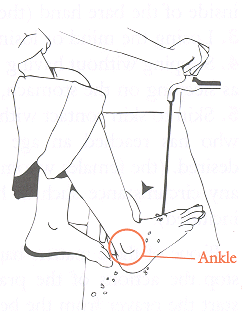 |
| Figure-7- | Figure-8- |
BenefitIt is preferred to use a small amount of water in wudu’ and ghusl. It is mentioned in Sahih Muslim that the Messenger of Allah used a mudd مد (about half a cup) of water for wudu’ and a sa^ صاع (about a pint) for ghusl. A mudd is the fill of a pair of average-sized hands cupped together. The sa^ is four mudds. It is also mentioned in Sahih Muslim that the Messenger of Allah used six (6) mudds (about 3 cups) of water for wudu’ and thirty (30) mudds (about one cup less than a gallon) for ghusl. Invalidators of Wudu’If you have wudu’ and any of the matters which invalidate wudu’ takes place, you must not pray until you make a new wudu’ Among the invalidators of wudu’ are: 1. The emission of any substance from the eliminatory outlets, such as urine, defecation, or gas, except maniyy. 2. Touching the penis or vagina, or the anus with the inside of the bare hand (the palm). 3. Losing the mind or losing consciousness 4. Sleeping without having the buttocks firmly seated, such as sleeping on the stomach, back, and on the side. 5. Skin to skin contact with a member of the opposite sex, who has reached an age where he or she is normally desired. (the females whom one is not allowed to marry in any circumstance such as his mother, sister etc. (are not included). 6. If one of these matters happens to you during prayer, you stop the actions of the prayer, perform wudu’ and then start the prayer from the beginning. Ghusl (Full Shower)You must perform a ghusl (full shower) in order to pray after: 1. You perform sexual intercourse. 2. Your menstruation ends. 3. Your postpartum bleeding ends. 4. You give birth to a child, even if it was without bleeding. 5. Your maniyy is emitted How to Perform GhuslAfter removing any najas from the body, the ghusl is performed in the following way: 1. It is obligatory for you to intend in the heart to perform the obligation of ghusl when the water first touches your body. 2. It is obligatory to wash the whole body with water, including all of the hair. It is recommended to to do this three times. When performing either the wudu’ or ghusl, all substances which prevent water from reaching the parts to be washed and wiped must be removed. Examples are: nail polish on fingernails and toenails and waterproof mascara. Tayammum (Dry Purification)In the absence of water or when unable to use water, one may instead of performing wudu or ghusl perform tayammum. This is stated in the Qur’an: فَلَمْ تَجِدُواْ مَاء فَتَيَمَّمُواْ صَعِيدًا طَيِّبًا فَامْسَحُواْ بِوُجُوهِكُمْ وَأَيْدِيكُم مِّنْهُ مَا يُرِيدُ اللهُ لِيَجْعَلَ عَلَيْكُم مِّنْ حَرَجٍ وَلَكِن يُرِيدُ لِيُطَهَّرَكُمْ وَلِيُتِمَّ نِعْمَتَهُ عَلَيْكُمْ لَعَلَّكُمْ تَشْكُرُونَ {{6 This verse means: “If you do not find water, then perform tayammum with the pure soil. Pass it onto your faces and arms”. (al-Ma’idah, 6). The Prophet said: <<جُعِلَتْ لنا الأرضُ كلٌُها مَسْجِداً وجُعِلَتْ تُربَتُها لنا طَهُوراً>> رواه مسلم which means: “The earth is made a place for our prayers, and its soil is made for our purification” (Muslim). One must make sure that the time of the prayer has set in before performing the tayammum. The tayammum is valid for one obligatory prayer only and for as many optional prayers as one wishes. However, one repeats the tayammum before each obligatory prayer. How to perform TayammumMake sure that you have pure, dusty soil unused before in tayammum (figure-1-). -
It is recommended to say Bissmillah. It is an obligation to strike the soil with your palms. Make the intention: “I intend to perform tayammum to make performing the prayer permissible” while transferring the soil until it touches your face (figure-2-).
-
Pass the soil on all of your face (figure-3-)
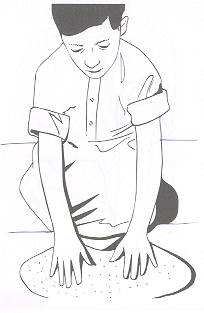 | 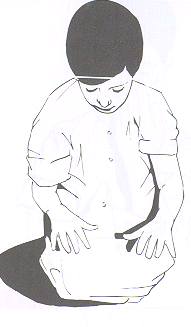 |
| Figure-1- | Figure-2- |
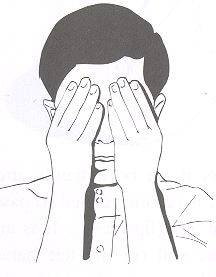 | 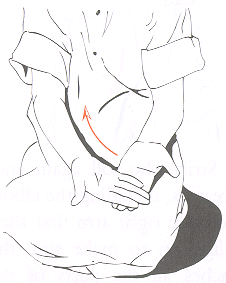 |
| Figure-3- | Figure-4- |
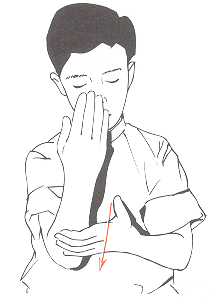 | 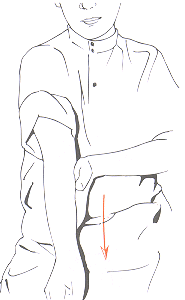 |
| Figure-5- | Figure-6- |
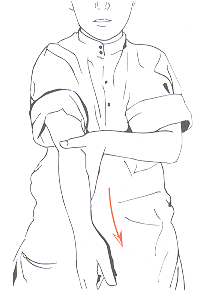 | 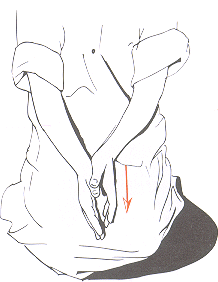 |
| Figure-7- | Figure-8- |
-
Strike the soil again and pass it on both hands and forearms, including the elbows. It is recommended to pass it on the right arm first then the left (figure-4-). It is an obligation to make sure that the soil on the left hand reaches all the parts of the right arm and conversely (figure-5 thru 8).
Knowing the Prayers and their TimesYou can pray only after being sure that the prayer time is in. Hence, you need to learn how to recognize when the prayer times come in and go out. The Five Obligatory PrayersAllah revealed: حافظوا على الصلوات which means: “Perform the [five obligatory] prayers” (al-Baqarah, 238). The Messenger of Allah said: which means: “There are five prayers that Allah obligated the slaves to perform. Whoever performs them properly without belittling their obligation, Allah promised to admit him into Paradise. Whoever leaves them out does not have a promise from Allah to have Paradise without torture before. If He willed, He tortures him, and if He willed, He forgives him”. Narrated by Ahmad in his Musnad. It is obligatory to perform each of these five prayers in its due time. It is better to perform each prayer early in its time. Dhuhr (Noon) Prayer [Four rak^ahs (cycles)]:Its time begins when the sun has declined westward from the middle of the sky (zenith). The time remains until the length of the shadow of an object becomes equal to that of the object per Se, in addition to the length of the shadow of that object when the sun was at its zenith. For example, if the length of your shadow when the sun is at its zenith is 5 feet and you are 6 feet high, then once your shadow becomes 11 feet long the Dhuhr prayer time ends. ^Asr (Mid-afternoon) Prayer [Four rak^ahs]As soon as the Dhuhr prayer time ends the ^Asr prayer time starts. Its time remains until sunset. Maghrib (Sunset) Prayer [Three rak^ahs]After the entire disk of the sun has set, then the Maghrib prayer time begins. This prayer time lasts until the redness has disappeared in the western horizon. ^Isha’ (Nightfall) Prayer [Four rak^ahs]As soon as the Maghrib prayer time is finished the ^isha’ prayer time begins. You can be certain that this prayer time is in when you can see many small stars in the sky on a clear night. This prayer time lasts until the true dawn appears. Subh or Fajr (Dawn) Prayer [Two rak ^ahs]The true dawn begins when we see light spread at the horizon in the East. When the true dawn appears the Fajr prayer time has begun and this prayer time remains until the first glimpse of the disk of the sun appears on the Eastern horizon. The Covering for the PrayerThe women must cover everything but their faces and hands with a material which conceals the color of their skin. The body must remain covered throughout the various movements of the prayer. So if, for example upon bending, the woman’s scarf hangs forward exposing her neck from an angle, this is not acceptable. Either the woman needs to be sure that her clothing is tucked in properly to prevent exposure, or she may put clothing over her normal clothing which does not allow exposure at angles. This clothing has an added benefit in that it conceals the shape of the body, for it is disliked for the shape of the woman’s body to be apparent while she is praying. For the man, his area between his navel and his knees must be covered during the prayer. Like for the woman, the material with which he covers this area must not be see-through; that is, it must be opaque so as to conceal the color of the skin.
Chapter 2: The Salah (Prayer) There are five (5) prayers which must be performed by the Muslims and are called “obligatory” prayers. It is a great sin to neglect performing any of these obligatory prayers. Among the merits of performing the obligatory prayers is that one’s small sins, which may be committed between prayers, are forgiven. The Prophet , may Allah raise his rank, said: which means: “Whoever makes a complete wudu’, his sins will depart his body, until they leave from under his nails” (Muslim). How to Perform the Dhuhr (Noon) PrayerThe Dhuhr Prayer is four rak^ahs 1. Facing the Qiblah: It is obligatory to stand directing your chest to the honorable Qiblah. The Qiblah is the Ka ^ bah in Makkah. 2. Intention: It is obligatory to intend in your heart performing the obligatory Dhuhr prayer. Do that while saying الله اكبر Allahu akbar (God is great). An example is to say in your heart “I intend to pray the obligatory Dhuhr prayer”.
3. The Opening Takbir: It is obligatory to say Allahu akbar at least as loud as you can hear yourself, while raising your hands next to your ears. Raising your hands is a recommended part (figure-1-).
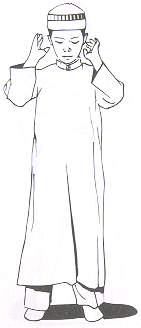 | 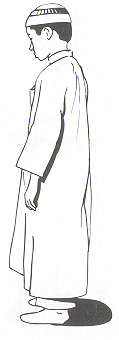 |
| Figure-1- | Figure-2- |
4. Standing: It is obligatory to stand in the obligatory prayer when able. It is recommended to hold the wrist of the left hand with the right hand, placing both above the navel (figure-2a-2b). 5. Reciting the Fatihah: It is obligatory to recite the Fatihah (the first chapter of the Qur’an) at least as loud as you can hear yourself. It is an obligation to recite the Fatihah properly, that is, to pronounce all the letters correctly. Learn the recitation of the Fatihah from a qualified teacher (see Appendix 3). Whoever cannot recite the Fatihah correctly must recite other parts of the Qur’an, the number of letters of which should be at least equal to that of the Fajihah (156 letters). If one knows one or more qyahs of the Fatihah, one may repeat them as many times as would render minimally the same number of letters in the Fatihah. If one cannot recite any ayah of the Fatihah, one recites other ayahs of the Qur’an the letters of which add up to at least the same number of letters of the Fatihah. If one cannot recite any part of the Qur’an, one must recite certain words of dhikr, such as
subhanallah, al-hamdulillah, la ilaha illallah, and Allahu akbar (I declare that Allah is clear of all imperfections, praise and thanks to Allah, no one is God but Allah, and Allah is the Greatest) as many times as would render minimally the same number of letters in the Fatihah (Ibn Hibban an-Nawawiyy):
For example, reciting Allahu akbar twenty times is sufficient. In the unusual case of someone being unable to recite the Fatihah, other parts of the Qur’an, or dhikr statements one stands as long as reciting the Fatihah with moderate speed takes.
It is recommended to say ءامين Amin (0 Allah, fulfill my request) after finishing the Fatihah, and to recite at least one verse from another chapter of the Qur’an in the first and second rak ah (see Appendix 5).
It is also recommended before reciting the Fajihah in the first cycle to say the Tawajjuh supplication and then the isti adhah (asking for Allah’s protection from the cursed devil) (see Appendix 2).
6. The Ruku^” (Bowing): It is obligatory to bend at the waist until your palms can reach your knees (figure-3-) and stay still in this position for at least the time it takes to say سبحان الله subhanallah. It is recommended upon bending to raise your hands next to your ears and say Allahu akbar. Also it is recommended while in ruku^, to say three times: سُبحانَ رَبِّيَ العظيم subhana Rabbiyal- ^Adhim (Praise be to my Great Lord).
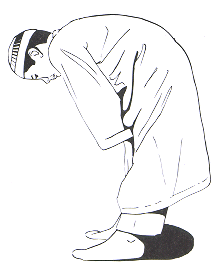 | 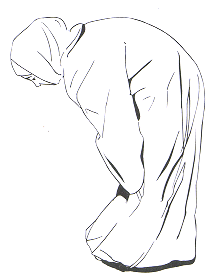 |
| Figure -3a- | Figure -3b- |
7. The I^ tidal (Straightening up): It is obligatory to straighten your back and stay still in this position for at least the time it takes to say subhanallah (figure-4-). It is recommended while raising your trunk to raise your hands next to your ears and to say سَمعَ اللهُ لِمَنْ حَمِدَهُ sami^ allahu liman hamidah (Allah hears who praises Him). While your back is straight up it is recommended to say رَبّنَا لَكَ الحَمدُ Rabbana lakal-hamd (0 our Lord, to You the praise is due). 8. The Sujiud (Prostration): It is obligatory to go down to the floor and prostrate by pressing your bare forehead, and putting your palms, knees, and pads of the toes on the floor. Both feet are kept vertical with the heels up and the toepads down touching the floor. Stay still in this position for at least the time it takes to say subhanallah (figure-5-).
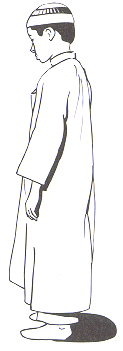 | 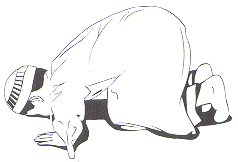 |
| Figure -4a- | Figure -4b- |
It is recommended upon going down to the floor to raise your hands next to your ears and to say Allahu akbar.
Also it is recommended while in sujud to say three times subhana Rabbiyal-’a la (Praise be to my Supreme Lord).
It is also recommended while in sujud to place your hands next to your shoulders, having your fingers together directed towards the Qiblah.
It is recommended for the male to keep his elbows away from his sides in his sujud and in his ruku ^, and to keep his abdomen lifted away from his thighs in his sujud (figure5a-5b). However, the female keeps her elbows pulled in to her sides in her sujud and ruku and keeps her trunk close to her thighs in her sujud (figure-5c-).
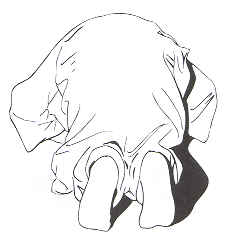 | 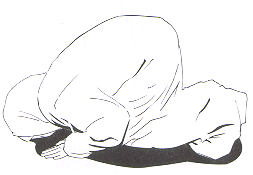 |
| Figure -5b- | Figure -5c- |
9. The Sitting between the two Sujuds: It is obligatory to raise your trunk from prostration and sit, staying still in this position for at least the time it takes to say subhanallah (figure-6a-). It is recommended to say Allahu akbar while coming to sitting.
Also, it is recommended while sitting to say:
Rabbighfir li warhamni wajburni warfa ^ ^ni warzuqni wahdini wa ^afini (0 my Lord, forgive me, have mercy on me, fulfill my needs, raise me, provide for me, guide me, and protect me from sickness). It is also recommended to do the sitting with the left foot tucked under the buttocks while the right foot is kept vertical as in sujud (figure-6b-).
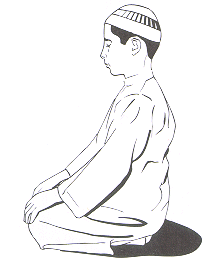 | 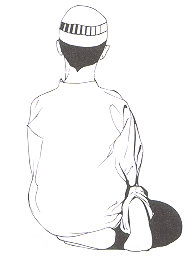 |
| Figure -6a- | Figure -6b- |
An alternate recommended way of sitting is to rest the buttocks on the heels
An alternate recommended way of sitting is to rest the buttocks on the heels of both feet which are kept as in sujud (figure-6c-)
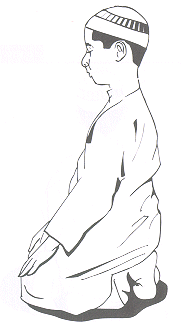 | 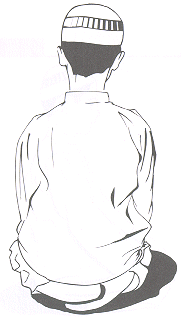 |
| Figure -6c- | Figure -7- |
It is recommended that the hands be placed on the thighs at the knees with the fingers extended and spread slightly towards the Qiblah.
10. It is obligatory to perform a second sujud from your sitting position. This sujud is similar to the first sujud. After the second sujud is fulfilled you have completed the first rak^ah (cycle) of the prayer.
11. It is obligatory to stand up for the second rak^ah . It is recommended while doing so to say Allahu akbar. Repeat steps 5 to 10. This ends your second rak^ah . 12. It is recommended at this time to sit up from sujud, recite the Tashahhud (see Appendix 4), and say Allahumma salli ^ala Muhammad (see Appendix 4) at least as loud as you can hear yourself. It is recommended to sit with the feet as in step 9. An alternate way of sitting is to rest the buttocks on both crossed feet (figure-7-). It is also recommended to keep both hands on your thighs. The fingertips of your left hand should be spread towards your knee. In this sitting, the fingers of the right hand are lightly fisted except for the index finger which is extended slightly down (figure-8a-). The index finger is lifted slightly at saying إلاّ الله illallah (in the Tashahhud) and is kept as such until the end of this sitting (figure-8b-).
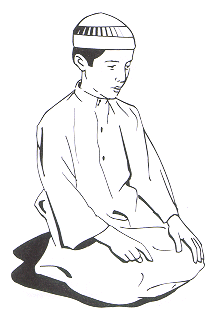 | 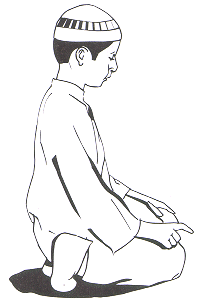 |
| Figure -8a- | Figure -8b- |
13. It is obligatory to stand up and do two more rak^ahs in the same way that you did from steps 5 to 11. It is recommended while rising for the third rak ^ah to raise your hands next to your ears and say Allahu akbar. However, raising the hands is not recommended while rising for the fourth rak^ah . 14. Upon completion of the second sujud of the last rak^ah, it is obligatory to sit up, recite the Tashahhud, and say Allahumma salli ^ala Muhammad (see Appendix 4). It is recommended to keep the hands as in step 12. However, after the index finger is lifted slightly at saying illallah it is kept as such until the end of the prayer.
For this sitting it is also recommended to pass the left foot past the right leg and place the buttocks on the floor, keeping the right foot as in sujuji (figure-9-).
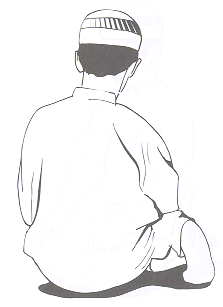 |
| Figure -9- |
Afterwards, it is recommended to say (see Appendix 4). Then it is recommended to say a supplication such as: Rabbana atina fid-dunya hasanah, wa fil- ‘akhirati hasanah, wa qina ^adhaban-nar, which means: “0 our Lord, grant us in this life and in the Hereafter good things, and protect us from the torture of the Hellfire”.
15. The Ending Salam: It is obligatory to say  assalamu ^alaykum at least as loud as you can hear yourself. It is recommended to say  as-salamu ^alaykum wa Rahmatullah first to one’s right and then to one’s left (figure-10-).
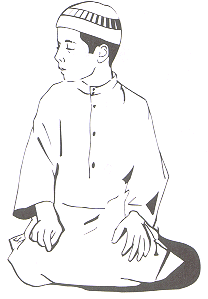 | 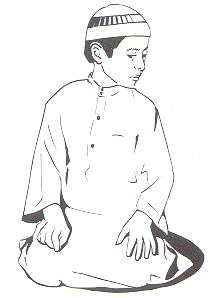 |
| Figure -10a- | Figure -10b- |
|
|
| Figure -10a- | Figure -10b- |
How to Perform the ^Asr (Mid-afternoon) and ^Isha’ (Nightfall) PrayersThe ^Asr and ^Isha’ prayers are performed exactly as the Dhuhr prayer. However, in step 2 you intend the obligatory ^Asr and ^ ^Isha’ prayers, respectively. Moreover, it is recommended to recite the Qur’an in a louder manner in the first two rak^ahs “ of the ^Isha’ prayer. How to Perform the Maghrib (Sunset) PrayerThe three rak^ahs ^ of the Maghrib prayer are performed exactly as the first three rak^ahs of ^Isha’. After the second sujud of the third rak^ah it is obligatory to sit up and do steps 14 and 15. How to Perform the Subh or Fajr (Dawn) PrayerThe two rak^ahs “ of the Fajr (or Subh) prayer are performed exactly like the first two rak^ahs of the ^Isha’ prayer, but with the intention of performing the obligatory Fajr (or Subh) prayer. After the second sujud of the second rak^ah ^ , do steps 14 and 15. Also after saying Rabbana lakal-hamd in the I^tidal (step 7) of the second rak^ah ^ , it is recommended to say the Qunut supplication (see Appendix 6) at least as loud as you can hear yourself. Invalidators of the PrayerIn addition to leaving out the obligatory parts, there are other matters that invalidate the prayer. They must be known to be avoided. Among these matters are: 1. Saying words other than the words of the prayer intentionally, remembering that one is praying, and knowing that it is forbidden to do so. 2. Making many moves for a time that is enough to make one rak^ah . 3. Performing an excessive move, such as an excessive jump. 4. Adding an extra obligatory action such as making two ruku^s or three sujuds in one rak^ah, on purpose and while remembering that one is praying. 5. Making one move with the intention of playing, such as to extend one’s tongue or to wink playfully. 6. Eating or drinking even a small amount while remembering one is praying. 7. Invalidating one’s ablution, such as passing gas or urine. 8. Intending in the heart to interrupt the prayer. Intending to interrupt it if a specific matter happens, such as if one holds: “if the door bell rings I will interrupt my prayer”, invalidates the prayer immediately. The Jam^ah (Congregational) PrayerIt is very rewardable to perform the five obligatory prayers in congregation. This can be done in the masjids (mosques) and elsewhere. In the congregational prayer one person (imam) leads the prayer, with one (ma’mum) or more persons following him. The reward of the prayer performed in congregation is 27 times that of the one performed individually, as mentioned in the hadith narrated by Imam Muslim: While following the imam in the congregational prayer: -
Your heels must not be ahead of those of your imam. It is recommended that they be behind those of the imam.
-
Say your opening takbir only after the iman has finished saying his opening takbir.
-
Have the intention to follow the iman. For example, intend in the heart to follow the imam, praying the obligatory Dhuhr prayer.
-
It is recommended that you wait for the iman to change his position before you go to that same position.
The Jumu^ah (Friday) PrayerFriday is the best day of the week. On Friday there are certain blessings that may be bestowed particular to that day. The Muslim men are required to attend the Friday prayer as stated in the Holy Qur’an (al-Jumu ^ah, 9): يَا أَيُّهَا الَّذِينَ ءامَنُوا إِذَا نُودِي لِلصَّلاةِ مِن يَوْمِ الْجُمُعَةِ فَاسْعَوْا إِلَى ذِكْرِ اللهِ وَذَرُوا الْبَيْعَ ذَلِكُمْ خَيْرٌ لَّكُمْ إِن كُنتُمْ تَعْلَمُونَ Prophet Muhammad said: which means: “Performing the Jumu ^ah prayer is an obligation upon every [male] pubescent person.” (anNasa’iyy) Although not obligated, women can pray the Friday prayer. The Friday prayer is usually performed in a congregation at a mosque. It is performed in the Dhuhr prayer time, replacing the Dhuhr prayer for that day. Instead of the four rak ^ahs of the Dhuhr prayer, you pray only two rak^ahs and begin your prayer intending to pray the congregational Friday prayer instead of intending the Dhuhr prayer. If you miss joining the group of the Friday prayer, then you must pray the Dhuhr prayer with its normal four rak ^ahs. At the Friday prayer, the group listens attentively to two speeches which the imam gives before the prayer. Both the speeches and the prayer are done in the Dhuhr prayer time,. and the prayer follows immediately after the speeches. Janazah (Funeral) PrayerUpon the death of a Muslim, Muslims are obligated to pray for him. Just like in the obligatory prayers, one must have wudu’. However, the Funeral prayer does not have ruku ^ or sujud. It is recommended that the dead person be laid in front of the imam. How to Perform the Janazah (Funeral) Prayer1. Stand facing the Qiblah with your chest. 2. Have the intention: “I intend to pray the Funeral prayer for this dead Muslim” while saying: Allahu akbar. 3. Recite the Fatihah softly, then say Allahu akbar. 4. Say Allahumma salli ^ ala Muhammad. It is better if you recite the whole Salatul-Ibrahimiyyah, then say Allahu akbar. 5. Make supplication for the dead Muslim Allahumma-ghfir lahu warhamh (u). It is better to include other Muslims and to say: Allahumma-ghfir lihayyina wa mayyitina, wa shahidina wa gha’ibina wa saghirina wa kabirina, wa dhakarina wa unthana. Allahumma man ahyaytahu minna fa ahyihi ^alal-Islam, wa man tawaffaytahu minna fa tawaffahu ^alal-’iman. This means: “0 Allah, forgive our dead and alive, our present and absent, our young and old, our male and female [Muslims]. 0 Allah, whomever among us You gave life, let him live with Islam. Whomever among us You took life from, let him die with Iman (Faith)”. Then say Allahu akbar.
6. It is recommended to say: Allahumma la tahrimna ajrahu wa la taftinna ba ^dah(u), which means: “0 Allah, do not deprive us of the reward of our praying for him, and do not test us after him”.
7. Say as-salamu ^ alaykum. It is recommended to say: assalamu ^alaykum wa rahmatullah while turning the head to the right, then to say it while turning to the left. Upon consoling a Muslim for the death of his Muslim beloved you say:
a ^ dhama-llau ajrak(a), wa ahsana ^aza’ak(a), wa ghafara limayyitik, which means: “May Allah reward you greatly, give you good patience, and forgive your deceased (loved) one”. However, upon consoling a Muslim concerning the death of a non-Muslim relative, you say:
a^dhama-llahu ajrak(a), wa sabbarak, which means: “May Allah reward you greatly and give you patience.”
Appendix 1What is Recommended to Say After Finishing Wudu’? Du ^a’-ul-Wudu’Ashhadu alla ilaha illallah (u), wahdahu la sharika lah (u), wa ashhadu anna Muhammadan ^ abduhu wa rasuluh (u). Allahumma-j ^ alni minat-tawwabin (a), waj ^ alni minalmutatahhirin. Subhanaka-llahumma wa bi hamdik (a), ashhadu alla ilaha illa ant (a), astaghfiruka wa atubu ilayk. The Meaning of the Wudu’ (Ablution) SupplicationI testify that no one is God but Allah, alone, without a partner, and I testify that Muhammad is His slave and messenger. 0 Allah, make me among the frequent repenters and make me among the purified. Praise and thanks be to You, 0 Allah. I testify that no one is God but You. I ask You for forgiveness and I repent to You.
Appendix 2What is Recommended to Say After Finishing the Opening TakbirDu ^a’uliftitah or Du ^a’ut-TawajjuhWajjahtu wajhiya lilladhi fataras-samawati wal-’arda hanifam Muslima, wa ma ‘ana minal-mushrikin. ‘Inna salati wa nusuki wa mahyaya wa mamati lillahi rabbil ^alamin (a), la sharika lah (u), wa bi dhalika ‘umirt (u), wa ‘ana minal-Muslimin. The Meaning of the Opening or Tawajjuh SupplicationI direct myself in worship to the One Who created the heavens and Earth, following the upright path, being a Muslim, and not among those who associate partners with Allah. Surely, my prayer, my acts of worship in obedience, my life, and my death belong to Allah, the Lord of the worlds, Who has no partner. With this I was ordered, And I am one of the Muslims. What is Recommended to Say Before the FatihahAlisti ^adhahA^udhu billahi minash-shaytanir-rajm The Meaning of the Isti ^adhahI seek refuge with Allah from the [harm of the] cursed devil.
Appendix 3What Must be Recited in Every Rak^ah سورة الفاتحة بِسْمِ اللهِ الرَّحْمَنِ الرَّحِيمِ {1} الْحَمْدُ للهِ رَبِّ الْعَالَمِينَ {2} الرَّحْمنِ الرَّحِيمِ {3} مَلِكِ يَوْمِ الدِّينِ {4} إِيَّاكَ نَعْبُدُ وإِيَّاكَ نَسْتَعِينُ {5} اهدِنَا الصِّرَاطَ المُستَقِيمَ {6} صِرَاطَ الَّذِينَ أَنعَمتَ عَلَيهِمْ غَيرِ المَغضُوبِ عَلَيهِمْ وَلاَ الضَّالِّينَ {7} Suratul-Fatihah1. Bismillahir-Rahmanir-Rahim. 2. Al-Hamdu lillahi Rabbil- ^alamin 3. Ar-Rahmanir-Rahim. 4. Maliki yawmid-Din. 5. Iyyaka na^budu wa iyyaka nasta^in. 6. Ihdinas-siratal-mustaqim 7. Siratal-ladhina an ^amta ^alayhim, Ghayril-maghdubi ^alayhim wa lad-dallin. The Meaning of the Fatihah1. I start my recitation with the Name of Allah (the One Who deserves to be worshipped), Who is ar-Rahman (the One Who is merciful to both Muslims and non-Muslims in this life), and ar-Rahim (the One Who is merciful to Muslims only in the Hereafter). 2. Praise and thanks to Allah, the Rabb (Owner) of the worlds (of angels, humans, jinn, and others) for the givings He granted without Him being obligated to do so. 3. He is ar-Rahman (the One Who is merciful to both Muslims and non-Muslims in this life), and ar-Rahim (the One Who is merciful to Muslims only in the Hereafter). 4. He is the Owner of the Day of Judgment. 5. To You (Allah) only we dedicate worship (the ultimate subjugation), and from You (Allah) only we seek help. 6. Keep us guided (firmly) on the Straight Path (Islam), 7. Which is the Path of those upon whom You bestowed guidance by Islam (prophets and other Muslims), not the path of those whom You willed to punish, or the path of those who went astray.
Appendix 4What is Said in the SittingAt-Tashahhud was-Salatul-’IbrahimiyyahAt-Tahiyyatul-mubarakat, as-salawatut-tayyibatu lillah. AsSalamu ^alayka ayyuhan-Nabiyyu wa rahmatullahi wa barakatuh. As-Salamu ^alayna wa ^ala ^ibadillahis-salihin Ashhadu alla ‘ilaha illallah, wa ashhadu anna Muhammadar-Rasulullah. (End of the Tashahhud) Allahumma salli ^ala Muhammad, (This completes the obligation) wa ^ala ‘Ali Muhammad, kama sallayta ^ala ‘Ibrahim, wa ^ala ‘Ali ‘Ibrahim. ‘Innaka Hamidum Majid. Allahumma barik ^ala Muhammad, wa ^ala ‘Ali Muhammad, kama barakta ^ala ‘Ibrahim, wa ^ala ‘Ali ‘Ibrahim. ‘Innaka Hamidum Majid. The Meaning of the Tashahhud and Salatul-’IbrahimiyyahThe blessed salutations, Five Prayers, and the good deeds are all owned by Allah. 0 Prophet of Allah, may the safety from infirmities, and the mercy of Allah and His blessings be upon you. May safety be upon us and upon the righteous slaves of Allah.
I profess (know, believe, and declare) that no one is God but Allah, and I profess that Muhammad is the Messenger of Allah. 0 Allah, we ask You to raise the rank of Muhammad, and have mercy upon the Al (wives, Muslim kin, and pious Muslim followers) of Muhammad, as You raised the rank of Ibrahim, and the Al of Ibrahim. Verily, You are the One Who deserves to be praised and thanked, and the One Who is glorified. 0 Allah, we ask You to bless Muhammad, and the Al of Muhammad, as You blessed Ibrahim, and the Al of Ibrahim. Verily, You are the One Who deserves to be praised and thanked, and the One Who is glorified.
Appendix 5Examples of What Could be Recited After the Fatihahءاية الكُرْسِيّ اللهُ لاَ إِلَهَ إِلاَّ هُوَ الْحَيُّ الْقَيُّومُ لاَ تَأْخُذُهُ سِنَةٌ وَلاَ نَوْمٌ لَّهُ مَا فِي السَّمَاوَاتِ وَمَا فِي الأَرْضِ مَن ذَا الَّذِي يَشْفَعُ عِنْدَهُ إِلاَّ بِإِذْنِهِ يَعْلَمُ مَا بَيْنَ أَيْدِيهِمْ وَمَا خَلْفَهُمْ وَلاَ يُحِيطُونَ بِشَىْءٍ مِّنْ عِلْمِهِ إِلاَّ بِمَا شَاء وَسِعَ كُرْسِيُّهُ السَّمَاوَاتِ وَالأَرْضَ وَلاَ يَؤُودُهُ حِفْظُهُمَا وَهُوَ الْعَلِيُّ الْعَظِيمُ ِِAyatul-Kursiyy
Bismillahir-Rahmanir-Rahim.
Allahu la ilaha illa Huwal-Hayyul-Qayyum,
la ta’khudhuhu sinatuwwala nawm,
lahu ma fis-samawati wama fil-’ard,
man dhalladhi yashfa^u ^indahu illa bi ‘idhnih,
ya^lamu ma bayna aydihim wama khalfahum,
wa la yuhituna bishay’immin ^ilmihi illa bima sha’,
wasi^a Kursiyyuhus-samawati wal-’ard,
wa la ya’uduhu hifdhuhuma,
wa Huwal- ^Aliyyul- ^Adhim.
The Meaning of Ayatul-Kursiyy
I start my recitation with the Name of Allah (the One Who deserves to be worshipped), Who is ar-Rahman (the One Who is very merciful to Muslims and non-Muslims in this life), and Who is ar-Rahim (the One Who is very merciful to Muslims only in the Hereafter).
Allah is the One Who is the Only God. He is the One Who is attributed with an eternal and everlasting Life (which is without soul, body, blood, bones or need for food). He is the One Who manages and takes care of the world and does not need any one and every one needs Him. He is not seized with somnolence or sleep. To Him belongs what is in the heavens and Earth. No one will intercede, on the Day of Judgment, except with His permission.
He knows all about His creation. They do not know except that which Allah allowed them to know.
His Kursiyy extends farther than the heavens and Earth and He is not exhausted from preserving them.
He is the One Who has the highest status (and does not need a place) and Who rightly has the attributes of exaltedness, glory, greatness, and purity from all imperfection.
سورة الإخلاص قُلْ هُوَ اللهُ أَحَدٌ {1} اللهُ الصَّمَدُ {2} لَمْ يَلِدْ وَلَمْ يُولَدْ {3} وَلَمْ يَكُن لَّهُ كُفُوًا أَحَدٌ {4} Suratul-’IkhlasBismillahir-Rahmanir-Rahim
1. Qul Huwallahu Ahad.
2. Allahus-Samad.
3. Lam yalid wa lam yulad.
4. Wa lam yakullahu kufuwan ahad.
The Meaning of Suratul-’Ikhlas
I start my recitation with the Name of Allah (the One Who deserves to be worshipped), Who is ar-Rahman (the One Who is very merciful to Muslims and non-Muslims in this life), and Who is ar-Rahim (the One Who is very merciful to Muslims only in the Hereafter).
1. [0 Muhammad,] say that Allah is One without a partner to Him in the Self or attributes, and the One Who is indivisible (because He is not a body.)
2. All creations need Allah and He does not need any of, them. He is the One to Whom all resort in all types of adversities. He does not benefit from His creations and does not ward any harm off Himself by them.
3. Nothing was born out of Him; so no one inherits Him. He was not born; so no one shares property with Him. He is not the origin of anything and He did not originate from anything. 4. He has no equal in any way.
سورة الفلق قُلْ أَعُوذُ بِرَبِّ الْفَلَقِ {1} مِن شَرِّ مَا خَلَقَ {2} وَمِن شَرِّ غَاسِقٍ إِذَا وَقَبَ {3} وَمِن شَرِّ النَّفَّاثَاتِ فِي الْعُقَدِ {4} وَمِن شَرِّ حَاسِدٍ إِذَا حَسَدَ {5} Suratul-FalaqBismillahir-Rahmanir-Rahim 1. Qul a^udhu birabbil-falaq. 2. Min sharri ma khalaq. 3. Wa min sharri ghasiqin idha waqab. 4. Wa min sharrin-naffathati fil- ^uqad. 5. Wa min sharri hasidin idha hasad. The Meaning of Suratul-FalaqI start my recitation with the Name of Allah (the One Who deserves to be worshipped), Who is ar-Rahman (the One Who is very merciful to Muslims and non-Muslims in this life), and Who is ar-Rahim (the One Who is very merciful to Muslims only in the Hereafter).
1. [O Muhammad,] say: I seek refuge with Allah, the Lord (Creator and Sustainer) of dawn,
2. from the evil of what He created (such as the Devil and fire),
3. and from the evil of the night when it comes,
4. and from the evil of the witches who blow on knots,
5. and the evil of the covetous one when he covets.
سورة الناس قُلْ أَعُوذُ بِرَبِّ النَّاسِ {1} مَلِكِ النَّاسِ {2} إِلَهِ النَّاسِ {3} مِن شَرِّ الْوَسْوَاسِ الْخَنَّاسِ {4} الَّذِي يُوَسْوِسُ فِي صُدُورِ النَّاسِ {5} مِنَ الْجِنَّةِ وَ النَّاسِ {6} Suratun-NasBismillahir-Rahmanir-Rahim
1. Qul a^udhu birabbin-nas.
2. Malikin-nas.
3. Ilahin-nas.
4. Min sharril-waswasil-khannas.
5. Alladhi yuwaswisu f sudurin-nas.
6. Minal-jinnati wan-nas
The Meaning of Suratun-NasI start my recitation with the Name of Allah (the One Who deserves to be worshipped), Who is ar-Rahman (the One Who is very merciftil to Muslims and non-Muslims in this life), and Who is ar-Rahim (the One Who is very merciful to Muslims only in the Hereafter).
1. [O Muhammad,] say: I seek refuge with Allah, the Lord (Creator and Sustainer) of mankind,
2. the Owner of mankind,
3. [the only] God of mankind,
4. from the evil of the whisperer who withdraws (when the Name of Allah is mentioned),
5. who whispers in the hearts of creations,
6. among the jinn and mankind.
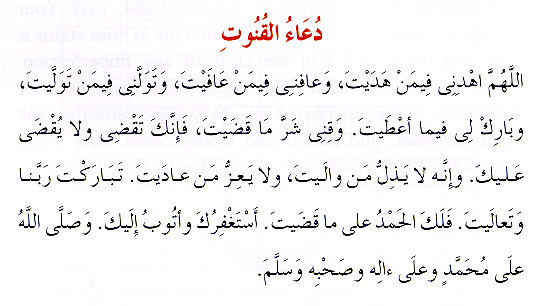 Appendix 6What is Said in the I^tidal of the Second Rak^ah of the Fajr PrayerDu^aul-QunutAllahummahdini fiman hadayt (a), wa ^afini fiman ^afayt (a), wa tawallani fiman tawallayt (a), wa barik li fima a^tayt (a). Wa qini sharra ma qadayt (a), fa ‘innaka taqdi wa la yuqda ^alayk (a). Wa ‘innahu la yadhillu maw walayt(a), wa la ya^izzu man ^adayt (a). Tabarakta Rabbana wa ta^alayt (a). Fa lakal-hamdu ^ala ma qadayt (a). Astagfiruka wa atubu ilayk (a). Wa sallallahu ^ala Muhammad (iwwa) ^ala alihi wa sahbihi wa sallam.
The Meaning of the Qunut SupplicationO Allah, guide me among those whom You guided, relieve me from sickness among those whom You relieved, support me among those whom You supported, bless for me what You gave me. Protect me against the evil of what You created, for You are the One Who orders (ordains) and not the One Who is ordered (ordained for). Whomever You support is not weakened and ignored, and whomever You oppose is not dignified. O our Lord, may Your givings increase. You are the Supreme One Whose status is high and great and You are clear of any imperfection. Praise is due for what You ordained. I ask You for forgiveness and I repent to You. May Allah raise the rank of Muhammad, and his Al and Companions. May Allah protect the Prophet’s Nation from what he feared for it.
|